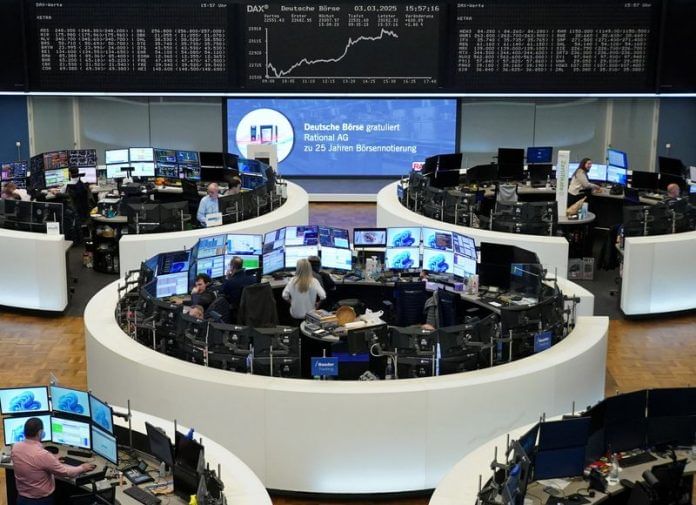By Caroline Valetkevitch
NEW YORK (Reuters) -Stocks were up sharply on Wednesday after U.S. President Donald Trump agreed to delay tariffs for one month on some vehicles built in North America, while the euro hit its highest in four months against the U.S. dollar.
The White House said the president came to the agreement after a call with the CEOs of General Motors and Ford and the chair of Stellantis .
U.S. tariffs on imports from Canada, Mexico and China went into effect on Tuesday.
Stocks were volatile near flat in early trading before turning sharply higher by the afternoon.
“It’s not a very consistent message that comes from the administration in the sense that they always seem open to changes, and yet the policies they’re announcing are pretty dramatic,” said Rick Meckler, partner at Cherry Lane Investments in New Vernon, New Jersey.
Investors also digested an ISM survey, which showed the U.S. services sector activity stood in the expansion territory at 53.5, higher than expectations of 52.6.
The Dow Jones Industrial Average rose 501.94 points, or 1.18%, to 43,022.93, the S&P 500 rose 68.16 points, or 1.18%, to 5,846.31 and the Nasdaq Composite rose 271.80 points, or 1.47%, to 18,554.63.
MSCI’s gauge of stocks across the globe rose 13.29 points, or 1.57%, to 859.43. The pan-European STOXX 600 index rose 0.91%.
The euro was up 1.32% at $1.0764, on track for its best weekly gain since November 2022. It got a boost late Tuesday when German political parties agreed to a 500 billion-euro ($534.75 billion) infrastructure fund and, crucially, an overhaul in borrowing limits that economists billed as “a really big bazooka”.
The overhaul to German government borrowing also triggered the biggest sell-off in the country’s debt since the late 1990s. Germany’s 10-year yield was last up 1.6 basis points at 2.8%.
U.S. Treasury yields were mostly higher as investors assessed the economic data while weighing the uncertainty surrounding Trump’s tariffs.
The yield on benchmark U.S. 10-year notes rose 6.9 basis points to 4.279%, from 4.21% late on Tuesday.
Investors also scrutinized the start of China’s annual sessions of its parliament, the National People’s Congress, at which Beijing retained a goal of roughly 5% economic growth for 2025.
The dollar weakened 0.20% to 7.237 versus the offshore Chinese yuan.
Oil prices ended lower after U.S. crude oil stockpiles posted a larger-than-expected build, adding to other headwinds.
Brent futures settled down $1.74, or 2.45% to $69.30 a barrel. U.S. West Texas Intermediate crude (WTI) settled down $1.95, or 2.86%, to $66.31 a barrel.
(Additional reporting by Amanda Cooper in London and Kevin Buckland in Tokyo; Editing by Richard Chang and Nick Zieminski)
Disclaimer: This report is auto generated from the Reuters news service. ThePrint holds no responsibility for its content.






